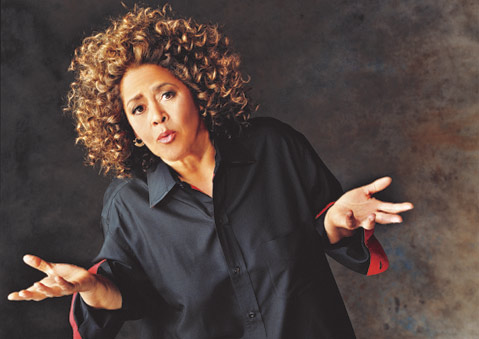‘Never Givin’ Up’ Comes to UCSB
Anna Deavere Smith Performs the Rhetoric of Civil Rights

Anna Deavere Smith, the performer responsible for Fires in the Mirror, Twilight: Los Angeles, and, more recently, Let Me Down Easy, a collection of testimonials about the body and health care, stands as the single most important figure to emerge from the downtown New York experimental theater scene of the late 20th century. Taking her cues from such pioneers as Richard Schechner, Elizabeth LeCompte, and Spalding Gray, Deavere Smith went on to explode the paradigm that marginalizes so-called avant-garde or alternative theater artists to small spaces and audiences. She accomplished this by applying her talent not just to the New York art scene, but to America as a whole, setting out on a series of journeys designed to capture the soul of this country through oral histories.
Like her hero Studs Terkel, the Chicago author, historian, and radio broadcaster who collected the voices of so many people in his book Working, Deavere Smith plays an active role in contemporary politics, and is not afraid to take a stand when it comes to the issues that matter to her. Yet, as anyone who has witnessed one of her scintillating performances can attest, she never does so at the expense of nuance or humanity in the portraits she creates. In fact, many of her greatest achievements have come when she articulates the perspectives of those who question, rather than corroborate, typical liberal values and opinions.
In her upcoming performance at UCSB, Deavere Smith will bring the voices of the American civil rights movement to life on stage with the aid of musical virtuosos Robert McDuffie and Anne Epperson. I spoke with Deavere Smith recently by phone, and what follows are some of the highlights of our conversation.
You are working with a live musical accompanist on this, the violinist Rober McDuffie. Is that a new development? I don’t remember seeing anyone on stage with you in the past.
I have been collaborating with musicians for the past four years or so. It started with a jazz bass player and eventually came around to what I’m doing now with Robert McDuffie and Anne Epperson.
This piece dealing with the civil rights movement includes Martin Luther King’s famous “Letter from Birmingham Jail.” How did the concept for Never Givin’ Up come to you?
The idea to do something with these words came about two summers ago when I was at the Aspen Institute for the Aspen Ideas Festival, which is an annual event that’s co-sponsored by The Atlantic. Kitty Boone from the Aspen Institute brought it to my attention that the Atlantic Monthly had been the original publisher of the “Letter from Birmingham Jail,” and she thought it would be a good way to commemorate that if I got to work on it.
As a young man in New York City I was intrigued by your work because you reminded me of some other theater artists that I liked, in particular the Wooster Group and the monologues of Spalding Gray. Did you know them?
Yes, I did. I am a big fan of the Wooster Group and I was strongly influenced by them, and especially by Spalding Gray’s monologues. Of course, Spalding was playing a version of himself, and I am not playing myself up there, so that’s a big difference, but what I got from him was the sense that everything you do as a monologist has significance. He taught me to be hyper-vigilant about the details in these performances, and to concentrate on that.
With Martin Luther King, are you aiming for that same kind of detail-oriented vocal impression?
No. The “Letter from Birmingham Jail” was originally a piece of writing, and King did make a recording of it, but I’m not too reliant on that version. My performance of the Letter is more an interpretation of the text than an impression of him.
The project you are currently developing involves incarcerated juveniles and the way that they seem to be herded in a negative direction. Is that what’s called the “school to prison pipeline”?
Yes, but I prefer the phrase “womb to prison,” because with “school to prison pipeline,” it sounds as though we are blaming the schools or the teachers, and that’s too much. It’s more about poverty to prison, or cradle to jail. And it’s just too big for schools to do anything much about it, so it winds up seeming as though it is a school to prison pipeline.
You teach at NYU. Is there a big difference between your students there and the students in the pipeline?
There’s a huge gap in opportunity. The gap that we are worried about is something that I started to notice in New York in the 1990s. The wealthy and the well-cared-for began to seem very different from everyone else. I see nannies in the West Village and they are talking nonstop to these privileged infants and toddlers, and I understand why, but what they are missing is that these studies that they are responding to, the ones that say how important it is to a child’s development to hear language early on, those studies were supposed to help poor children! That work was done to get people to talk to kids who were in poverty, not so that someone would hire a graduate student to talk all day to a child who is already privileged.
4•1•1
Never Givin’ Up by Anna Deavere Smith with Robert McDuffie, violin and Anne Epperson, piano, will be presented by UCSB Arts and Lectures at Campbell Hall on Sunday, October 18 at 7 p.m. For tickets and information, call 893-3535 or visit artsandlectures.sa.uscb.edu.



